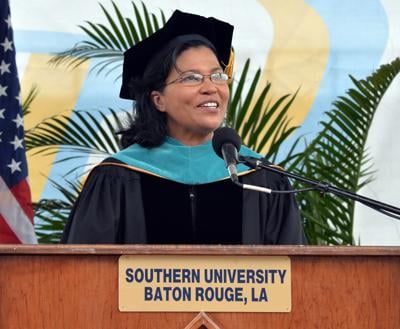Leaders of Louisiana's public schools, colleges and universities are launching an ambitious program to remake high schools, end the "wasted" senior year and better prepare students for college or a career.
The program, called "Fast Forward," would allow juniors and seniors to spend most of their time earning an associate degree taking classes at a community or technical college, a state-approved satellite campus or taking part in an apprenticeship.
"We know that the entry point of work now is seldom the high school degree," state Superintendent of Education Cade Brumley said. "The entry point of work also requires a credential, an apprenticeship, an associate degree or a professional degree."
Commissioner of Higher Education Kim Hunter Reed said the overhaul is nothing short of a bid to reimagine what a high school looks like.
"We need it because we need to make sure that high schools are more relevant to today's students," Reed said. "It can be a real game changer."
One of the driving forces behind the push is the tiny number of high school students who earn associate degrees while in high school – 159 out of 42,650 graduates in the latest tally.
One year after Louisiana's public high school graduation rate reached a milestone celebrated by state leaders, the rate has dropped, the state…
"It is not even a third of a percent," Brumley noted.
Louisiana also has long had low numbers of students who take classes for both high school and college credit – dual enrollment – amid problems on how to finance them and make them accessible to students in rural areas.
A state task is expected to approve recommendations Wednesday aimed at launching a statewide system that eventually ensures all high school st…
Barely 1 in 5 high school juniors and seniors were pursuing college classes in high school in the most recent count.
At the same time, only 40% of high school seniors take a full course load.
Reed said the new options addresses the issue of the "wasted senior year."
The plan would give students three options that would drastically change their third and fourth years of high school.
One would allow students who pursue a career and technical education diploma – called Jump Start – to earn a technical associate degree on college campuses with courses that also earn them high school credits.
The rebirth of Louisiana's career and technical education system could become one of the state's biggest education success stories in recent years.
Another option would let students who plan to attend a four-year university earn an associate degree that would allow them to start college as juniors.
The third path would let students pursue an apprenticeship approved by the Louisiana Workforce Commission that would put them on the path to a substantive job after high school.
The ninth and 10th grades would remain largely unchanged – students taking core academic classes for meeting their high school diploma requirements.
The plan has won approval from the state Board of Elementary and Secondary Education and the Board of Regents.
Last week the state Department of Education issued a request for applications to start the effort in eight regions across the state.
Grants of up to $50,000 will be awarded to regional secondary schools systems and higher education officials in each area to start mapping plans and prepare pilot projects.
Education leaders hope students can start pursuing the new options in the next few years.
Officials with the Baton Rouge Area Chamber have been involved in the planning.
Liz Smith, vice-president for economic competitiveness for BRAC, said the overhaul carries the added benefit of making better use of community and technical colleges.
"We just know that we really underutilize community colleges here in Louisiana," Smith said. "We underutilize them in a variety of ways and one of those ways is in dual enrollment."
While funding and other key hurdles remain, members of a state task force Monday said eligible Louisiana high school students should have acce…
Smith acknowledged that high school students can pursue associate degrees today. "What this does is it motivates people to actually do it," she said.
"If this is going to make it so that more kids have easier access to the community college programs, to that dual-enrollment credit, it spurs adults to do the right thing for students."
Michael Hecht, president and CEO of Greater New Orleans Inc., said the program can have an impact.
"I think that the 'Fast Forward' program is recognizing what the students and businesses are demanding in today's world," Hecht said. "Students are demanding an education that will lead to a well-paying job and businesses are asking for students who have work-ready skills on day one.
"By blurring the lines between a high school degree and an associate degree the 'Fast Forward' initiative should not only help students get a more valuable education quicker."
"It should also help our two-year institutions more efficiently and fully utilize their resources," he said.
Monty Sullivan, president of the Louisiana Community and Technical College System, said the changes will expand access to high school courses that include college credit.
"Dual enrollment has for far too long been perceived as for smart kids," Sullivan said. "What "Fast Forward" proposes is an opportunity for all kids to have access to post secondary education while they are in high school."
About 160,000 students are enrolled annually in community and technical colleges. Roughly 8,000 are taking dual-enrollment courses.
"The high school senior year has been almost an afterthought from an academic point of view," Sullivan said. "This gives students an opportunity to really engage in that senior year and make some progress."
He added, "A high school diploma simply will not allow you to survive in this country. The new standard in this country is having some level of skills beyond high school."










